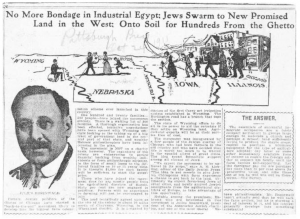North America
Brief Overview
The meaningful farming chapter of the Jewish story in North America from the 1890s until the 1950s began humbly in the 1820s in an aborted attempt to establish a Jewish homeland on the Niagara River. Failure of the Am Olam communes in the 1880s did not bode well for the future of Jewish farming on the continent. Things changed for the better, however, once domestic philanthropists and the American branch of Baron de Hirsch’s Jewish Colonization Association mobilized for large-scale projects in the 1890s. With their help – and with everyone involved learning from past errors – by the early 1900s a new generation of colonies had appeared with much greater chances for success. Like everywhere in the modern Jewish world, leaders in North America hoped that the farming life would help their brethren from Europe support their families and spearhead a kind of communal physical and moral renewal that could never happen in overcrowded cities of the East Coast.

Outdoor market, Lower East Side of Manhattan, 1912
Many Jewish immigrants would have been among the peddlers pictured here.
Credit: Save Ellis Island
The wave of Jewish emigration from Eastern Europe to North America between the early 1880s and the mid-1920s both motivated and fed the agricultural settlement programs. During these decades more than 2,000,000 Yiddish-speaking Jews arrived in search of better, more peaceful lives than what they had known in Europe. The pamphlet below, published in 1891 by the Russo-Jewish Committee of the British Board of [Jewish] Deputies, and distributed widely, described the antisemitic policies and actions perpetrated by the Russian Empire. Publications like these sparked mobilization among Jewish leaders and communities in the West for their co-religionists in Eastern Europe.

